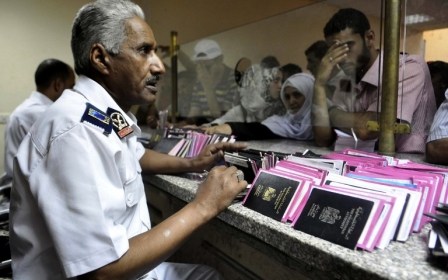Arabic press review: Iranian anger at government hypocrisy

Mounting anger in Iran at government
Amid the imposition of the second batch of US sanctions, various segments of Iranian society have been complaining about the government’s practices, according to a report by Asharq al-Awsat.
The Saudi newspaper quoted a merchant, named Chahine, who owns a grocery store in Tehran, saying: "Two months ago, the shelves in my shop were loaded with goods, but now the store is getting emptier day after day,” adding that “people are not buying goods anymore, as prices are increasing not even on a monthly but on a daily basis, as if we do not have a government."
Prices in Iran have hit record highs over the past two months, with a 300 percent increase in the cost of food and dairy products, the report said.
Iranians are tired of the slogans raised by a regime that denies its people the right to live with dignity not only on this earth or even in the afterlife
- Sheikh Hadi, cleric
With the rising popularity of social media platforms, Iranians have seen politicians who show public hostility towards the US and the West sending their children to live there, while hundreds of thousands of children in various Iranian cities do not have access to the basics of a dignified life, the Saudi newspaper reported.
Sheikh Hadi, a cleric in his seventies, exclaimed: “They are living in privilege, while the rest of us are suffering," noting that “Iranians are tired of the slogans raised by a regime that denies its people the right to live with dignity not only on this earth or even in the afterlife.
"It is not only about the US sanctions, as the problem originates mainly from the government’s troublesome interferences worldwide. The Iranian regime has forgotten its people and got involved in other countries’ businesses."
Jordanian teacher arrested over Facebook posts
The public prosecutor in Jordan has ordered the arrest of a university teacher, Mohamed Zayed Obeidat, because of comments he published on his Facebook page, according to the Jordanian newspaper al-Ghad.
A Jordanian source said Obeidat had accused the head of the department of health in the city of Irbid of giving rotten vaccines to 59 students in one school a month ago, prompting a government official to file a complaint against him.
Obeidat also published allegations of leaking and selling exam questions at the Faculty of Medicine, University of Jordan, and accused a number of government officials of being involved.
Obeidat holds a PhD in media studies and works as a professor at the Media Department at Zarqa Private University in Jordan.
Jordan to discuss Palestinian pilgrim ban in Riyadh
Jordan's minister of religious affairs, Abdel Nasser Abu al-Basal, said an official delegation would visit Saudi Arabia in order to discuss Riyadh’s denial of visas to Palestinians with temporary Jordanian passports from performing the pilgrimage, according to news website Arabi21.
Abu al-Basal added that the delegation consists of representatives of the Ministries of Interior, Foreign Affairs and Endowments and will travel to Saudi Arabia during the coming days to discuss this issue.
"Jordan has issued temporary passports for the Palestinians for the pilgrimage and visiting holy sites. This procedure has been operative for many years following the decision of the late King Hussein bin Talal," he clarified.
In Jordan, there are more than 140,000 Palestinians from the Gaza Strip holding temporary Jordanian passports. Those individuals were prevented from entering Saudi Arabia and visiting the holy places to perform Hajj and Umrah, following a move by Riyadh in September.
In total the ban affects more than 600,000 Palestinians.
Middle East Eye propose une couverture et une analyse indépendantes et incomparables du Moyen-Orient, de l’Afrique du Nord et d’autres régions du monde. Pour en savoir plus sur la reprise de ce contenu et les frais qui s’appliquent, veuillez remplir ce formulaire [en anglais]. Pour en savoir plus sur MEE, cliquez ici [en anglais].




